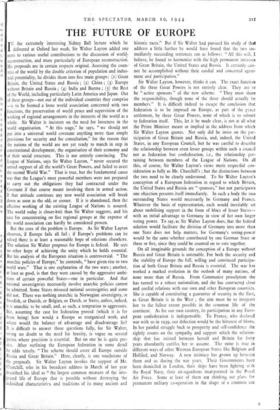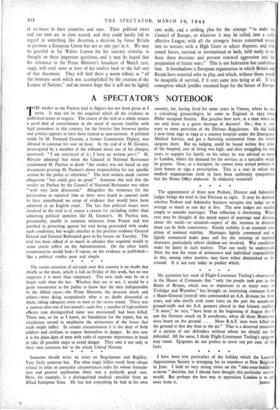THE FUTURE OF EUROPE
I N the extremely interesting Sidney Ball lecture which he delivered at Oxford last week, Sir Walter Layton added one more to various useful contributions to the discussion of world: reconstruction, and more particularly of European reconstruction. His proposals are in certain respects original. Assessing the coun- tries of the world by the double criterion of population and indus- trial potentiality, he divides them into five main groups: (a) Great Britain, the United States and Russia ; (2) China ; (3) Europe without Britain and Russia ; (4) India and Burma ; (5) the Rest of the World, including particularly Latin America and Japan. Out of these groups—not out of the individual countries they comprise —is to be formed a loose world association concerned with two functions, the preservation of world peace and supervision of the working of regional arrangements in the interests of the world as a whole. Sir Walter is insistent on the need for looseness in the world organisation. "At this stage," he says, "we should not put into a universal world covenant anything more than simple provisions for security and for consultation," for the reason that the nations of the world are not yet ready to march in step in constitutional development, the organisation of their economy and of their social structure. This is not entirely convincing. The League of Nations, says Sir Walter Layton, "never secured the united support of all the world's Great Powers, and failed to avert the second World War." That is true, but the fundamental cause was that the League's most powerful members were not prepared to carry out the obligations they had contracted under the Covenant if that course meant involving them in armed action. If that attitude continues any new world association will break down as soon as the old, or sooner. If it is abandoned, then the effective working of the existing League of Nations is assured. The world today is closer-knit than Sir Walter suggests, and his case for concentrating on five regional groups at the expense of the world association can hardly be considered proven.
But the crux of the problem is Europe. As Sir Walter Layton observes, if Europe fails all fail ; if Europe's problems can be solved there is at least a reasonable hope of solutions elsewhere. The solution Sir Walter proposes for Europe is federal. He sees no other hope of achieving the unity which he holds essential. But his analysis of the European situation is controversial. "The anarchic policies of Europe," he contends, "have given rise to two world wars." That is one explanation of the two wars ; another, at least as good, is that they were caused by the aggressive ambi- tions of certain powerful States—one in particular. And that national sovereignties necessarily involve anarchic policies cannot be admitted. Some States misused national sovereignties and some did not. There was nothing anarchic in Norwegian sovereignty, or Swedish, or Danish, or Belgian, or Dutch, or Swiss, unless, indeed, it is anarchic to be small, and, as such, a temptation to aggressors. But, assuming the case for federation proved (which it is far from being) how would a Europe so reorganised work, and where would the balance of advantage and disadvantage lie? It is difficult to answer those questions fully, for Sir Walter, owing no doubt to the need for brevity, is vague on several Points where precision is essential. But on one he is quite pre- cise. After outlining the European federation in some detail he adds tersely, "The scheme should cover all Europe outside Russia and Great Britain." Here, clearly, is one touchstone of the proposals. Sir Walter Layton invokes the support of Mr. Churchill, who in his broadcast address in March of last year described his ideal as "the largest common measure of the inte- grated life of Europe that is possible without destroying the individual characteristics and traditions of its many ancient and historic races." But if Sir Walter had pursued his study of the* address a little further he would have found that the two im- mediately succeeding sentences ran as follows: "All this will, I believe, be found to harmonise with the high permanent interests of Great Britain, the United States and Russia. It certainly can- not be accomplished without their cordial and concerted agree- ment and participation."
Sir Walter Layton, however, thinks it can. The exact function of the three Great Powers is not entirely clear. They are to be "active sponsors" of the new scheme. "They must share the responsibility, though none of the three should actually he members." It is difficult indeed to escape the conclusion that federation is to be imposed on Europe, as part of the peace settlement, by three Great Powers, none of which is to submit to federation itself. This, let it be made clear, is not at all what the Prime Minister meant or implied in the address from which Sir Walter Layton quotes. Not only did he insist on the par- ticipation of Great Britain and Russia, and, indeed, the United States, in any European Council, but he was careful to describe the relationship between even lesser groups within such a council not as federation but confederation, i.e., the relationship per- taining between members of the League of Nations. On all this, of course, Sir Walter Layton's views merit respectful con- sideration as fully as Mr. Churchill's ; but the distinctions between the two need to be clearly understood. To Sir Walter Layton's conception of a European federation in regard to which Britain, the United States and Russia are "sponsors," but not participants one objection presents itself immediately. In such a body the two outstanding States would necessarily be Germany and France. Whatever the basis of representation, each would inevitably set about mobilising support in the form of blocs of lesser Stares— with an initial advantage to Germany in view of her own larger voting power. To say, as Sir Walter Layton does, that the federal solution would facilitate the division of Germany into more than one State does not help matters, for Germany's voting-power would be the same whether contributed by one German State or three or five, since they could be counted on to vote together.
On all imaginable grounds the conception of a Europe without Russia and Great Britain is untenable. For both the security and the stability of Europe the full, willing and convinced participa- tion of both Great Britain and Russia is essential The war has worked a marked evolution in the outlook of many nations, of none more than of Russia. From Communist proselytism she has turned to a robust nationalism, and she has contracted close and cordial relations with our own and other European countries. She is capable of constituting a guarantee of security in the East, as Great Britain is in the West ; the aim must be to integrate her to the fullest extent possible in the common life of the ' continent. As for our own country, its participation in any Euro- pean confederation is indispensable. To France, who declared war with us in 1939, our defection would be the bitterest of blows. In her painful struggle back to prosperity and self-confidence she rightly counts on the sympathy and support which the relation- ship that has existed between herself and Britain for forty years abundantly entitles her to assume. The some is true in different ways of other Western European States like Belgium and Holland, and Norway. A new intimacy has grown up between them and us during the war years. Their Governments have been domiciled in London, their ships have been fighting w:th the Royal Navy, their air-squadrons incorporated in the Royal Air Force. Some at least of them are thinking out plans for permanent military co-operation in the shape of a common use of air-bases in their countries and ours. Their political views and our own are in close accord, and they could hardly fail to regard as something like desertion a decision by Great Britain to promote a European Union but not to take part in it. We may be gratefur to Sir Walter. Layton for his salutary stimulus to thought on these important questions, and it may be hoped that his reference to the Prime Minister's broadcast of March 21st, 1943, will send some at least of his readers back to the full text of that document. They will find there a warm tribute to "all the immense work which was accomplished by the creation of the League of Nations," and an earnest hope that it will not be lightly cast aside, and a striking plea for the attempt "to make the Council of Europe, or whatever it may be called, into a really effective League, with all the strongest forces concerned woven into its texture, with a High Court to adjust disputes, and with armed forces, national or international or both; held ready to en- force these decisions and prevent renewed aggression and the preparation of future wars." This is not federation but confedera- tion. It foreshadows a European organisation in which Britain and Russia have essential roles to play, and which, without them, would be incapable of survival, if it ever came into being at all. It is a conception which justifies reasoned hope for the future of Europe.



























 Previous page
Previous page